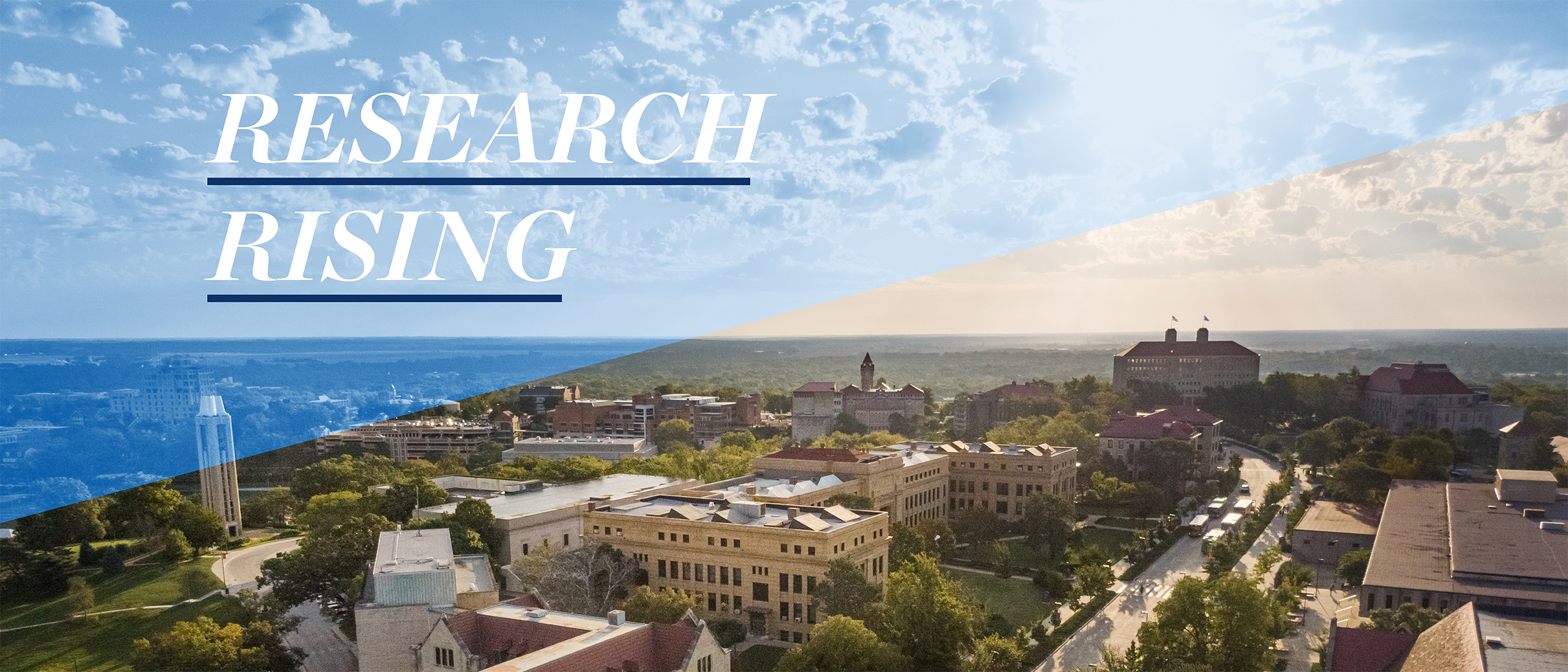10 finalists advance in Research Rising

LAWRENCE — Ten projects have been selected to advance to the second phase of the review process for Research Rising, one of KU’s most significant investments in its research enterprise to date. The proposed projects address major questions pertinent to critical challenges facing humanity, demonstrate a high probability of building teams capable of competing successfully for federal research funding, and align with one or more of KU’s five strategic research areas. Finalists will submit full proposals by April, and up to four teams will be identified through a rigorous, peer-reviewed process to receive up to $3 million over five years to support their projects.
Learn more about the finalists:
Securing Our Worlds: Physical, Digital, Social
This proposal would form an interdisciplinary, multi-center organization focused on finding solutions to otherwise unsolved problems related to safe and secure physical, digital and social environments — ultimately creating more secure and resilient communities.
Lead PI: Perry Alexander, AT&T Distinguished Professor, electrical engineering & computer science, and director, Information & Telecommunication Technology Center
Brain-Inspired Computing Consortium
This proposal would bring together researchers working at the intersection of bioengineering, artificial intelligence, big data science and nanotechnology to pair insights into how the human brain and body function together with recent technological developments to create new imaging and computing devices, new algorithms, and new brain-machine interfaces for medical applications.
Lead PI: Alice Bean, University Distinguished Professor, physics & astronomy
Addressing Social Inequities in Urban Resilience to Climate Change
This proposal aims to address the need to increase scientific understanding of how social and environmental factors impact resilience to heat events at the local level and to leverage that improved understanding of the complex determinants of climate change to sustainably advance health equity and urban resilience in communities.
Lead PI: Nathaniel Brunsell, professor of geography & atmospheric science
Advancing Intellectual and Developmental Disabilities Research at KU
This proposal would maintain and enhance KU’s international prominence in intellectual and developmental disabilities (IDD) research by investing in genomics and data science/bioinformatics approaches to IDD — two areas that are a high priority for NIH, critical for advancing understanding of basic mechanisms of IDDs, important for developing more targeted and effective therapeutics, and essential for reaching a larger and more diverse range of affected individuals.
Lead PI: John Colombo, professor of psychology, and director, Life Span Institute
Energy Transition and Resilience Institute
This proposal would form a research institute that would (1) develop new technologies to produce low-cost, accessible energy with lower emissions, store energy and preserve water resources, and (2) design innovative mitigation strategies with the ultimate goal of sustaining the planet and its inhabitants while reducing the threats to societal well-being and security caused by climate change and energy inequity.
Lead PI: Robert Goldstein, Haas Distinguished Professor, geology
Science and Technologies for Addressing Health Disparities
This proposal would create a center focused on fundamental and translational research to develop — and produce at low cost — novel devices that can be programmed to detect, recommend treatment and assess treatment effectiveness for different diseases, and be deployed in underserved areas with health disparities.
Lead PI: Steven Soper, Foundation Distinguished Professor, chemistry and mechanical engineering
Rising Homes: The Future of Sustainable Housing
This proposal would bring together researchers spanning engineering, social welfare, architecture, political science, environmental science, public policy and journalism to define and design cost-effective sustainable housing ecosystems that maximize benefits and ensure the immediate and long-term well-being of vulnerable individuals, families and households.
Lead PI: Elaina Sutley, associate professor of civil, environmental & architectural engineering
Growing KU’s Interdisciplinary Strengths in Genomics
This proposal aims to unlock the secrets held in genomes to understand where we come from, how we fight disease, how organisms respond to a changing environment/climate, and new bioengineering approaches for sustainable development and health advances.
Lead PI: Rob Unckless, associate professor of molecular biosciences
Artificial Intelligence for Molecules and Medicines
This proposal aims to harness the power of machine learning and artificial intelligence to increase the speed and decrease the cost of designing novel drug molecules for treating Alzheimer’s, cancer and other diseases, ultimately making therapeutics more accessible and improving public health.
Lead PI: Ilya Vakser, professor and director, Center for Computational Biology
Big Data for Drug Discovery
This proposal would integrate cutting-edge biotechnologies that collect large amounts of data in order to create a more holistic understanding of human diseases and empower the discovery of new drugs to treat them.
Lead PI: Michael Wolfe, Mathias P. Mertes Professor, medicinal chemistry